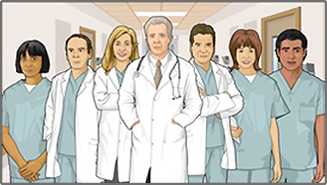Aging changes in the kidneys and bladder
The kidneys filter the blood and help remove wastes and extra fluid from the body. The kidneys also help control the body's chemical balance.
The kidneys are part of the urinary system, which also includes the ureters, bladder, and urethra.
Muscle changes and changes in the reproductive system can affect bladder control.
AGING CHANGES AND THEIR EFFECTS ON THE KIDNEYS AND BLADDER
As you age, your kidneys and bladder change. This can affect their function.
Changes in the kidneys that occur with age:
- Amount of kidney tissue decreases and kidney function diminishes.
- Number of filtering units (nephrons) decreases. Nephrons filter waste material from the blood.
- Blood vessels supplying the kidneys can become hardened. This causes the kidneys to filter blood more slowly.
Changes in the bladder:
- The bladder wall changes. The elastic tissue becomes stiffer and the bladder becomes less stretchy. The bladder cannot hold as much urine as before.
- The bladder muscles weaken.
- The urethra can become partially or totally blocked. In women, this can be due to weakened muscles that cause the bladder or vagina to fall out of position (prolapse). In men, the urethra can become blocked by an enlarged prostate gland.
In a healthy aging person, kidney function declines very slowly. Illness, medicines, and other conditions can significantly degrade kidney function.
COMMON PROBLEMS
Aging increases the risk of kidney and bladder problems such as:
- Bladder control issues, such as leakage or urinary incontinence (not being able to hold your urine), or urinary retention (not being able to completely empty your bladder)
Urinary incontinence
Urinary (or bladder) incontinence occurs when you are not able to keep urine from leaking out of your urethra. The urethra is the tube that carries ...
 ImageRead Article Now Book Mark Article
ImageRead Article Now Book Mark Article - Bladder and other urinary tract infections (UTIs)
Urinary tract infections
A urinary tract infection, or UTI, is an infection of the urinary tract. The infection can occur at different points in the urinary tract, including...
 ImageRead Article Now Book Mark Article
ImageRead Article Now Book Mark Article - Chronic kidney disease
Chronic kidney disease
Chronic kidney disease (CKD) usually causes the slow loss of kidney function over time. The main job of the kidneys is to remove wastes and excess w...
 ImageRead Article Now Book Mark Article
ImageRead Article Now Book Mark Article
WHEN TO CONTACT A MEDICAL PROFESSIONAL
Contact your health care provider right away if you have any of the following:
- Signs of a urinary tract infection, including fever or chills, burning when urinating, nausea and vomiting, extreme tiredness, or flank pain
- Very dark urine or fresh blood in the urine
- Trouble urinating
- Urinating more often than usual (polyuria)
Urinating more often than usual
Frequent urination means needing to urinate more often than usual. Urgent urination is a sudden, strong need to urinate. This causes a discomfort i...
 ImageRead Article Now Book Mark Article
ImageRead Article Now Book Mark Article - Sudden need to urinate (urinary urgency)
Urinary urgency
Frequent urination means needing to urinate more often than usual. Urgent urination is a sudden, strong need to urinate. This causes a discomfort i...
 ImageRead Article Now Book Mark Article
ImageRead Article Now Book Mark Article
As you grow older, you will have other changes, including:
- In the bones, muscles, and joints
In the bones, muscles, and joints
Changes in posture and gait (walking pattern) are common with aging. The skeleton provides support and structure to the body. Joints are the areas w...
 ImageRead Article Now Book Mark Article
ImageRead Article Now Book Mark Article - In the male reproductive system
- In the female reproductive system
In the female reproductive system
Aging changes in the female reproductive system result mainly from changing hormone levels. One clear sign of aging occurs when your menstrual perio...
 ImageRead Article Now Book Mark Article
ImageRead Article Now Book Mark Article - In organs, tissues, and cells
In organs, tissues, and cells
All vital organs begin to lose some function as you age. Aging changes occur in all of the body's cells, tissues, and organs, and these changes affe...
 ImageRead Article Now Book Mark Article
ImageRead Article Now Book Mark Article
Reviewed By
Frank D. Brodkey, MD, FCCM, Associate Professor, Section of Pulmonary and Critical Care Medicine, University of Wisconsin School of Medicine and Public Health, Madison, WI. Also reviewed by David C. Dugdale, MD, Medical Director, Brenda Conaway, Editorial Director, and the A.D.A.M. Editorial team.
Griebling TL. Aging and geriatric urology. In: Partin AW, Dmochowski RR, Kavoussi LR, Peters CA, eds. Campbell-Walsh-Wein Urology. 12th ed. Philadelphia, PA: Elsevier; 2021:chap 128.
Smith PP, Kuchel GA. Aging of the urinary tract. In: Fillit HM, Rockwood K, Young J, eds. Brocklehurst's Textbook of Geriatric Medicine and Gerontology. 8th ed. Philadelphia, PA: Elsevier; 2017:chap 22.
Walston JD. Common clinical sequelae of aging. In: Goldman L, Cooney KA, eds. Goldman-Cecil Medicine. 27th ed. Philadelphia, PA: Elsevier; 2024:chap 24.
Disclaimer
© 1997- A.D.A.M., a business unit of Ebix, Inc. Any duplication or distribution of the information contained herein is strictly prohibited.



